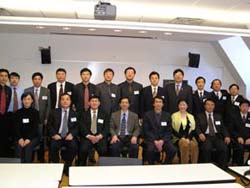University Leaders From China Attend TC Seminar
The participants consisted of presidents and vice-presidents from 13 national research-oriented universities as well as senior personnel concerned with high-education policies in China.
The seminar covered university research development and technology transfer and provided the Chinese participants an opportunity to better understand how major universities in the United States promote excellence in research and commercialize research output. It also gave them a chance to share their experience with their U.S. counterparts.
The seminar began with a two-week workshop held at TC, consisting mostly of presentations and discussion led by leading experts from academia, the private sector, as well as government and professional organizations. The Chinese participants then headed for a field study in Washington, D.C., visiting NIH, NSF, ACE, and a science-policy office in the U.S. Congress.
The last two weeks of the seminar were devoted to a more in-depth field study of three universities: Columbia University, Stanford University, and Massachusetts Institute of Technology.
The seminar was jointly organized by the Center on Chinese Education at TC and the National Academy of Educational Administration (NAEA), China. In China, NAEA has the primary responsibility of organizing and providing training to university leaders and other senior leaders in the education sector.
This seminar is part of a multi-year program to upgrade the skills and knowledge of leaders of national universities in China to foster university excellence in the global environment of the twenty-first century.
Published Friday, Sep. 3, 2004
